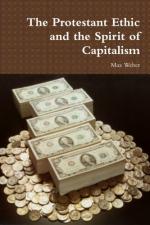
|
| Name: _________________________ | Period: ___________________ |
This test consists of 15 multiple choice questions and 5 short answer questions.
Multiple Choice Questions
1. Why does the author say a man should pay his debts on time?
(a) So he can borrow when he needs it.
(b) So he can lend money to others.
(c) So he can remain honest.
(d) So he can be free.
2. What did Frederick I of Prussia tolerate about the religion he said was indispensable?
(a) Their refusal to be in the military.
(b) Their refusal to pay taxes.
(c) Their refusal to wear normal clothing.
(d) Their refusal to work on Sunday.
3. What does leadership in Capitalism require?
(a) Education.
(b) Wealth.
(c) Confidence.
(d) All of these.
4. What do most Catholics do in school?
(a) Avoid mathematical associations.
(b) Stick with their craft.
(c) Stop to have families.
(d) Study historical items.
5. What did Medieval Capitalistic societies lack?
(a) Ethos.
(b) Education.
(c) Backing.
(d) Goods and services.
6. What does the author strongly state is NOT a part of Capitalism?
(a) Growth.
(b) Greed.
(c) Competition.
(d) Success.
7. What does the author say will most alter a population for the best?
(a) Capitalism.
(b) Religion.
(c) Education.
(d) Theocracy.
8. How does the author say men should spend money?
(a) Sparingly.
(b) Within their means.
(c) Honestly.
(d) Locally.
9. How is the percentage of Catholic graduates in Bavaria in relation to Protestants?
(a) They are much less.
(b) They are ahead.
(c) They are the same.
(d) They are lagging.
10. What did the Reformation NOT get rid of?
(a) Control over life.
(b) Lack of education.
(c) Ethical dilemmas.
(d) Religious ideals.
11. What did Montesquieu say England was successful in?
(a) Liberty.
(b) Religion.
(c) Business.
(d) All of these.
12. What is unique about most skilled laborers?
(a) They are not needed full time.
(b) They work well no matter the wage.
(c) They can choose their wages.
(d) They make companies profitable.
13. Why did the author hesitate to define the spirit of capitalism?
(a) There is not really a definition.
(b) It changes a lot.
(c) There are lots of different definitions that fit.
(d) It thins out the discussion.
14. How is money looked at in modern economies?
(a) Greedy.
(b) Virtuous.
(c) Provident.
(d) Socialistic.
15. Why does Pieter de la Court say people work?
(a) They are stupid.
(b) They are poor.
(c) They are desperate.
(d) They are bored.
Short Answer Questions
1. What caused the Catholic church to be called a certain word int he 15th century?
2. What does Austria not consider when buying imports?
3. Where do most Capitalism leaders get their money?
4. How do Catholics look at risk?
5. What word is used to describe the Catholic church in the 15th century?
|
This section contains 431 words (approx. 2 pages at 300 words per page) |

|




